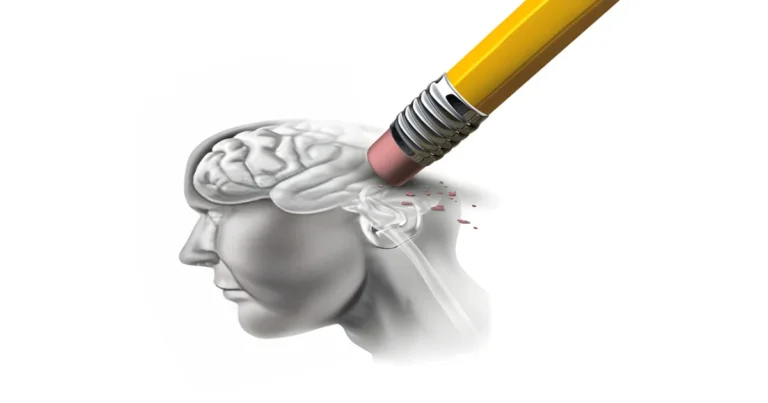The mystery of Alcohol Blackouts: Understanding memory disruption
There are times in life when we wish we could erase certain memories, painful or burdensome recollections that loom over our everyday lives. However, forgetfulness, a process that may seem passive, remains one of the most enigmatic functions of the brain. This mystery grows even deeper when forgetting becomes sudden, severe, and utterly uncontrollable. Such is the case with alcohol-induced blackouts, where entire blocks of memory disappear after excessive alcohol consumption. These episodes, at once fascinating and alarming, are a type of abrupt amnesia triggered by disruptions in the brain’s circuitry under the influence of alcohol. Like a missing reel in a film, they wipe out hours of memories, sometimes permanently. But what exactly happens in the brain when these “black holes” take over?
Far from being a minor footnote, this phenomenon illuminates underlying mechanisms at the intersection of memory neurobiology and the chemistry of the brain. Understanding why alcohol can so radically erase certain experiences, and how the brain determines which fragments of our lives to store or discard, opens a doorway to hidden realms where science, vulnerability, and human curiosity converge.
While researchers explore ways to deliberately forget or erase distressing memories, the alcoholic blackout presents a paradox: it is an involuntary erasure, often assumed to be temporary, but it can leave lasting marks. It challenges our understanding of what it truly means to remember. What occurs in those moments when our memory vanishes? And more importantly, what does this phenomenon reveal about our capacity to control what we retain and what we forget?
Chasing shadows: the elusive nature of memory
In 1970, a study at the University of Washington revealed a disconcerting puzzle about memory. Ten men with a history of alcoholism were given moderate amounts of alcohol over four hours. Researchers then showed them images and tested their recollection two minutes, 30 minutes, and 24 hours later. The results were striking: although most could recall the images immediately, only a few could remember them half an hour later, and for many, the memories had vanished completely by the next day.
This selective amnesia, known as a “blackout,” has intrigued scientists for decades.
To delve deeper into how alcohol erases these memories, a team at the French National Institute of Health and Medical Research (INSERM), led by Mickael Naassila, created an animal model under the European AlcoBinge project. The animals were exposed to blood alcohol levels resembling those seen in binge drinking; 48 hours later, their ability to learn and form new memories was severely compromised. When presented with a novel object, they seemed incapable of recognizing it, suggesting the brain’s ability to establish lasting memories had effectively been cut off.
Why does this erasure occur? The key lies deep within the brain’s memory mechanisms. Rapid, excessive alcohol intake, known as binge drinking, dramatically disturbs normal hippocampal function. The hippocampus is crucial for converting lived experiences into long-term memories. This disruption inhibits a neurochemical mechanism called long-term depression, which is necessary for forming and consolidating episodic memory. While some types of memory, such as procedural learning (skills and habits), may remain largely unaffected, personal memories evaporate as if the brain has ceased recording altogether.
At very high blood alcohol concentrations, hippocampal neurons lose their ability to communicate effectively, amplifying the problem of failing to encode events. Still, these disturbances vary among individuals due to biological, genetic, and behavioral factors, making binge drinking’s effects both universal in mechanism and unique in how they manifest.
The blackout effect: how alcohol wipes the slate clean
Early in a drinking episode, alcohol typically induces pleasurable sensations: relaxation, euphoria, and sometimes excitement. Beneath these positive effects, however, lie far more damaging consequences that are often underestimated, particularly by younger drinkers.
As alcohol levels rise, judgment is impaired, memory functions become erratic, motor coordination worsens, and reactions to danger slow down. With excessive or rapid consumption, blood alcohol levels spike quickly, severely compromising the hippocampus and greatly increasing the risk of experiencing a memory blackout.
Alcohol-induced blackouts appear in two main forms, partial and complete, each differing in severity and underlying mechanisms. Partial blackouts, more common, involve fragmented memory in which certain recollections from the intoxication period remain while others are completely lost. These disordered “gaps” in memory can make it difficult to piece together the sequence of events. This is linked to an intermittent disruption of hippocampal functions caused by high (but not maximal) levels of alcohol, allowing some memories to be recorded while others slip away.
While certain forms of memory, such as gestures and habits (procedural memory), may remain intact, personal memories fade away, as if the brain momentarily stops recording.
By contrast, complete blackouts are far more severe, resulting in total, permanent amnesia of events that occurred. No matter how many cues or reminders are given, no memories can be retrieved because the hippocampus was essentially shut down by the high level of intoxication. In partial blackouts, memory fragments might still surface, but in a complete blackout, it is akin to filming without any film in the camera, nothing is recorded. The difference underscores variations in how intensely alcohol impairs the brain.
It is particularly unsettling that during a blackout, individuals often appear fully conscious: they speak, interact, and even perform complex tasks, but they retain no memory of these actions. In a complete blackout, this phenomenon becomes especially dangerous, as the total lack of memory encoding heightens the risk of reckless behavior, accidents, or traumatic experiences, all without subsequent recall. It is as if the brain continues to function on autopilot, but the hippocampus is off-duty, leaving no record of events. This perplexing split, where someone may appear lucid but remain incapable of forming memories, continues to challenge our understanding of how alcohol disrupts brain circuits by disabling essential memory functions while leaving other cognitive processes intact.
How alcohol disturbs neurochemistry
At the neurobiological level, alcohol acts like a clumsy orchestra conductor, affecting multiple neurotransmitter systems at once. By disrupting the brain’s finely tuned chemical balance, it profoundly alters both cognitive and motor functions.
One of the first systems affected is the GABAergic system, the brain’s main inhibitory network. GABA (gamma-aminobutyric acid) serves as the brain’s natural “brake,” slowing cortical activity to create relaxation and calm. Under the influence of alcohol, GABA release increases, amplifying feelings of tranquility and reducing anxiety. However, an excess of GABA can overly slow the central nervous system, disturbing neuronal communication, particularly by affecting glutamate, an excitatory neurotransmitter crucial for memory formation and emotional regulation. Alcohol blocks NMDA receptors (linked to glutamate), a factor that helps explain the “memory gaps” associated with excessive drinking.
But alcohol’s effect goes further. Besides enhancing GABA’s inhibitory role and reducing glutamate’s excitatory impact, it disrupts the serotonergic system, which helps regulate mood and emotions. Compounding the disruption, alcohol also stimulates the reward circuit. By prompting a surge in dopamine, a molecule strongly associated with pleasure and reward, it sets off a cycle of reinforcement. Each drink heightens the desire for the next, creating a loop where fleeting euphoria can spiral into dangerously high intoxication. Accompanying this euphoria are unwanted effects: impaired balance, slowed reflexes, and slurred speech, among others.
Genetic lottery: why blackouts affect people differently
One particularly intriguing aspect of alcoholic blackouts is that not everyone experiences them. Some individuals can consume large amounts of alcohol without ever blacking out, while others seem prone to it even after moderate drinking. This puzzling contrast, noted by both scientists and healthcare professionals, is driven by a complex interplay of genetic, biological, and behavioral factors.
Several elements contribute to an individual’s risk of blackout or their relative resilience. How quickly someone drinks is critical: rapid consumption spikes blood alcohol levels, overwhelming the hippocampus and severely disrupting its functions. Genetic factors add further complexity. A study led by Elliot C. Nelson at Washington University in St. Louis (“Genetic Epidemiology of Alcohol-Induced Blackouts,” 2004) found that genes primarily influence two aspects: the brain’s sensitivity to alcohol and the rate at which the body metabolizes it. Variations in enzymes like alcohol dehydrogenase can facilitate faster alcohol breakdown, potentially lessening its effect on the brain. Other genetic variants impact GABA receptor sensitivity, altering an individual’s level of relaxation or vulnerability to alcohol’s disruptive effects on memory.
Such genetic predispositions intertwine with biological differences, including sex and body composition. Women, for instance, often reach higher intoxication levels than men after consuming comparable amounts of alcohol. Taken together, these factors help explain why certain people are more likely to experience alcohol-related memory losses, whereas others seem less susceptible to its amnesic side effects.
How binge drinking affects young minds
Binge drinking, often defined as consuming large amounts of alcohol in a short span to quickly achieve intoxication, is widespread among young people. This behavior exposes adolescent brains, which have not fully matured, to particularly harmful neurotoxic effects. Incomplete brain development during adolescence makes it more vulnerable to permanent changes from early alcohol exposure, reshaping neural circuits in ways that heighten alcohol sensitivity later in life.
Binge drinking impairs crucial brain functions, including neurogenesis (the formation of new neurons), and causes potentially irreversible damage to white matter, the substance that facilitates communication between brain regions.
Imaging studies consistently show reduced volumes in the hippocampus, prefrontal cortex, and cerebellum in young binge drinkers compared to their non-drinking peers. These structural changes translate into cognitive deficits: for instance, a study by Scaife at the University of Sussex found that young binge drinkers underperformed in visual memory tasks, with the severity correlating directly to the amount of alcohol consumed. Such deficits extend beyond memory, affecting executive functions like planning, reasoning, and impulse control.
Alarmingly, these neurological impairments mirror the abnormalities seen in adults with chronic alcoholism. This similarity suggests that heavy drinking during adolescence can accelerate some of the damaging effects typically associated with older alcohol-dependent populations. These findings underscore the importance of protecting young people from heavy drinking, as the long-term risks to their developing brains, and, consequently, their cognitive abilities, are significant.
The hidden dangers of alcohol: time for a wake-up call
Alcoholic blackouts, often trivialized in casual conversation, reveal just how vulnerable our cognitive systems can be in the face of heavy drinking. Behind these unsettling lapses lie deeper realities: damage to vital structures such as the hippocampus and prefrontal cortex, along with disruptions to memory processes and decision-making. Far from a transient inconvenience, such effects should be viewed as harbingers of serious long-term harm, especially for younger individuals whose brains are still developing.
Each episode of binge or excessive drinking leaves a trace on the brain, gradually undermining its capacity to adapt and recover. These scientific insights call for a collective awakening: alcohol, when consumed in excess, is not merely a fleeting source of pleasure. It also poses a real threat to our cognitive and mental health over time.
Greater emphasis on prevention and education about alcohol’s risks is therefore crucial. Only by recognizing the potential impacts of heavy drinking can we protect our most remarkable organ, our brain, and ensure it remains healthy for learning, feeling, and engaging with the world. Safeguarding this delicate balance is both a personal and collective responsibility that we can no longer afford to ignore.
Reference:

Sara Lakehayli
PhD, Clinical Neuroscience & Mental Health
Associate member of the Laboratory for Nervous System Diseases, Neurosensory Disorders, and Disability, Faculty of Medicine and Pharmacy of Casablanca
Professor, Higher School of Psychology







